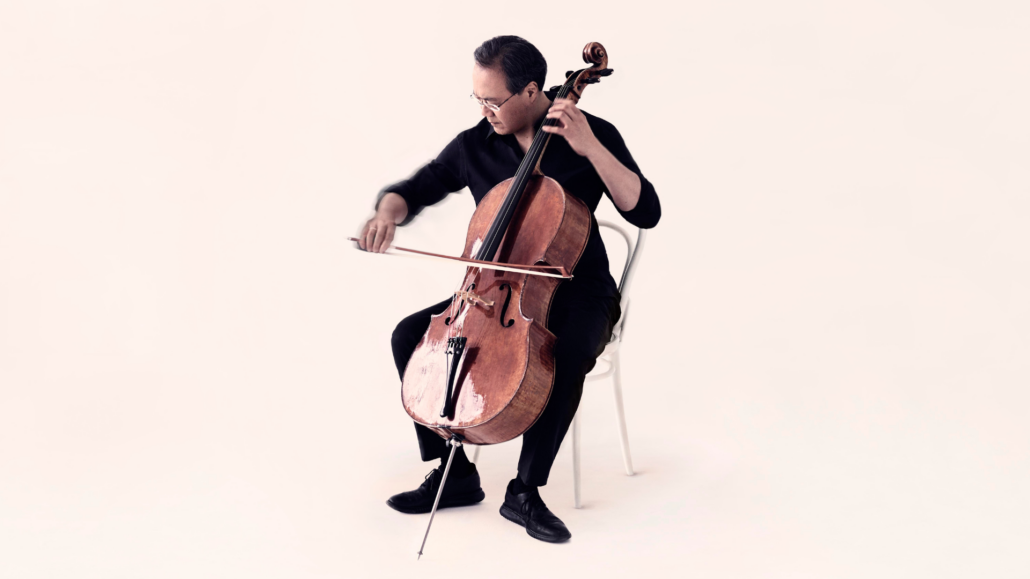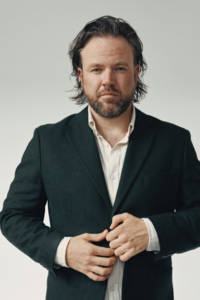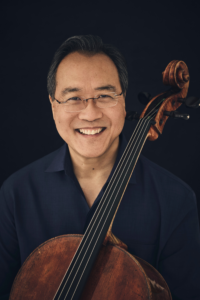YO-YO MA IN CONCERT
The big news, of course, is that classical-music superstar Yo-Yo Ma is coming to play with the Victoria Symphony, in what is rightly hailed as a major coup for the orchestra’s management and an equally outsized vote of confidence in its music director, Christian Kluxen.
“What can I say?” the latter enthuses. “To attract someone like Yo-Yo Ma here is a privilege. It will be a wonderful experience, not only for the audience but also for the orchestra.”
But the program that Kluxen and Ma have assembled for the 2024-25 Masterworks finale is much, much more than simply a chance for listeners to bask in the warmth of Ma’s cello while congratulating themselves on their good fortune.
There’s a secret agenda at play here, or so we suspect, and it has to do with the way we make music in the 21st century. Every year, it seems, we progress towards transnational forms of music-making, abandoning narrow genre boundaries as well as geographical ones, and with his stunningly innovative Silk Road Ensemble, Yo-Yo Ma has been at the forefront of that movement. Yet here Ma is playing a concerto written by the man many consider England’s national composer, Edward Elgar, which Kluxen has paired with the Symphony No. 2 in D major by Elgar’s Finnish contemporary and counterpart, Jean Sibelius.
What gives?
“I always love to put Sibelius and Elgar together,” Kluxen begins. “It’s difficult to say why, but I’ve always felt that Elgar and Sibelius, if you look at where they come from, are composers who reach out of the closed box of their original habitat. Elgar reaches deeply into the Central European, Straussian way of orchestrating, and Sibelius reaches deeply into French Impressionism—if you don’t perform his music as Tchaikovsky!
“The Symphony No. 2 was, by the way, the first Sibelius I conducted, when I was 20 with my youth orchestra in Copenhagen, and it has always been very close to my heart,” he continues. “And it’s really not big, romantic, nationalistic music. It is very well-constructed and delicate music and so it has to be played with the utmost care and transparency.”
Parallels with Elgar are easy to find. The English composer is best known for penning actual anthems—the famous Pomp and Circumstance marches, for instance—but he wrote the Cello Concerto in E minor immediately after the end of the First World War, which was technically a victory for the United Kingdom but one that came at a crippling cost. There’s a searching, contemplative side to Elgar here that sits well with Ma’s artistic nature—and with the cellist’s desire to communicate universal feelings in sound.
“The four strings on the cello are like my vocal cords, are attached to my vocal cords,” Ma told this writer in 2014. “So with whatever you think should be reflected in the sound—in the musculature of how you pull the bow and how it comes out—there should be no impediment between the thought and the sound. That’s something people strive for, but you never want to hear ‘So-and-so’s a really good instrumentalist.’ What you want to hear is ‘Oh, that makes me think.’ ”
Another point of entry to this program is that one thing we all share is the natural world. Sibelius is in many ways the master of symphonic landscape painting; his larger works convey a sense of the endless forests and waterways of the Northern world. Elgar, in turn, has been clearly shaped by the rolling contours and pastoral views of the English countryside. And for Canadian composer Jennifer Butler, whose And Birds Do Sing (a VS commission) opens this program, there’s an even more direct connection with nature.
“We fret and we worry about the state of the planet and the state of the future, and if anything that’s become worse since 2010, when I wrote the piece,” she explains. “I think I was pregnant when I got the commission, and my initial intent was to write quite a dark, pessimistic piece, which fits the genre of contemporary music. There’s a lot of those brooding, dark pieces. But then I ended up writing the piece after giving birth to my daughter—and there’s something about bringing a child into the world, I guess, that didn’t allow me to dwell on pessimism any more. I had to find hope.
“It’s the most joyful and the least conflicted piece I’ve ever written,” she adds.
So, in a sense, this program opens with hope, moves through various aspects of melancholic beauty, and then concludes with a more expansive vision. And while it might seem natural to finish the night—and the season—with the spotlight on its illustrious guest star, Kluxen contends otherwise.
“It’s very important to me that we always remember that it is the orchestra and the players who create the music on-stage,” he says. “It is their season; it is their gift to our audience. We could end with a big bang, but Yo-Yo Ma is, to me, too good a musician to be the fireworks at the end of a concert.
“I want to honour that,” he adds. “And I also want to end with the orchestra speaking the last word, and sending the audience out of the door saying ‘Come back next season! We’re looking forward to it.’ That’s what we think is important.”
Notes by Alex Varty



 Christian Kluxen, conductor
Christian Kluxen, conductor Yo-Yo Ma, cello
Yo-Yo Ma, cello